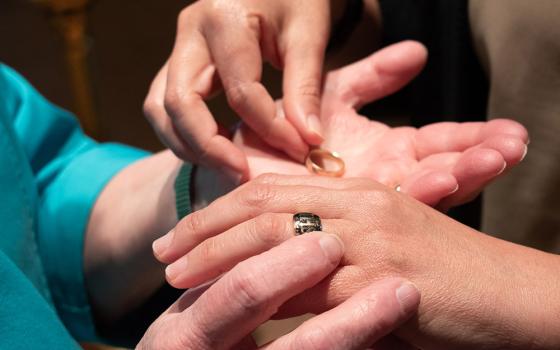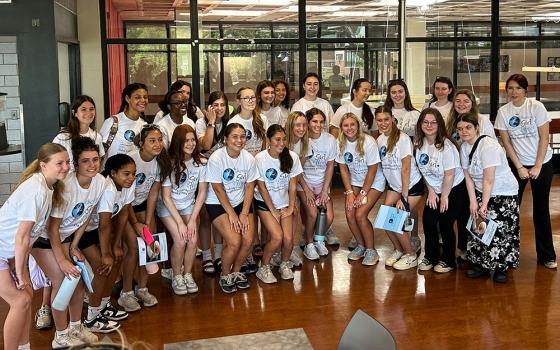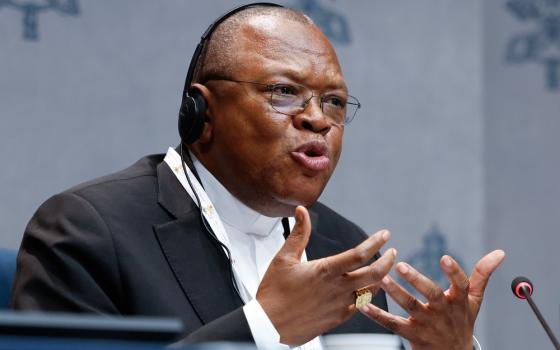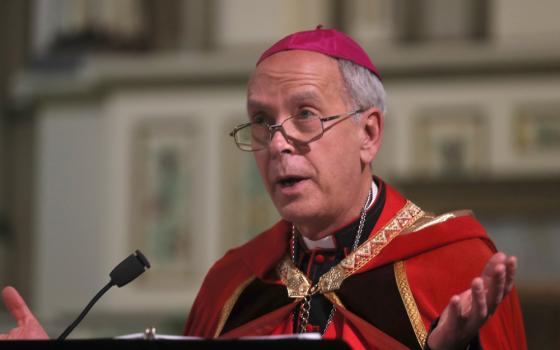Dominican Sr. Margaret Smyth, director of the Riverhead, New York-based North Fork Spanish Apostolate, embraces two children at St. John the Evangelist Church in Riverhead in January 2015. (CNS/Gregory A. Shemitz)
Sr. Margaret Smyth, a fervent advocate for the poor and migrant communities and who led an apostolate serving Spanish-speaking immigrants in eastern Long Island for 23 years, died Dec. 19, 2022. She was 83.
A member of the Sisters of St. Dominic of Amityville, New York, Smyth died at her home in Riverhead.
Smyth led the North Fork Spanish Apostolate in Riverhead for 23 of the 26 years it has existed. In 2014, she took on the social ministry at St. John the Evangelist, integrating the work of both entities to serve people in need.
Colleagues recalled Smyth for her dedication to people who were hungry, without adequate housing and who lived in poverty.
"There's nobody like her. The impression she made on this community will go on and on. Everybody around here is just brokenhearted," Eileen Mattausch, a volunteer who worked with Smyth for nearly 20 years, told the news outlet RiverheadLOCAL.
"There's going to be a tremendous hole. All along, you know, we will have always said, no one could ever fill the shoes that she wore," Mattausch added.
Advertisement
Parishioner Ivan Sacor said Smyth's death "devastated" the immigrant community. "She was a great leader," he told the news outlet.
He remembered the Dominican "as a mother, a person who was always there for others, as a religious and also for moral support, financial support, whatever she could give, she gave it."
Smyth entered the convent at age 17 a few months after her graduation in 1957 from St. Agnes High School in College Point, New York. It marked the beginning of life devoted to ministry that spanned 65 years.
Her decision to enter religious life was formed by her family, including an uncle who was a Salesian priest, and the Amityville Dominicans, who administered and taught at the school.
Born Oct. 29, 1939, to Irish immigrant parents, Smyth grew up in the New York borough of Queens. In a 2015 interview with Catholic News Service, she described her parents as "great role models" in teaching the Catholic faith.
"They never went to bed at night without saying the rosary. I can remember learning my first prayers from my parents," she said. "We had a picture of Our Lady on the wall and my mother had us all kneeling down and taught us the different prayers in front of the picture."
Dominican Sr. Margaret Smyth chats with Jacqueline Secaida, 15, following the girl's quinceañera Mass on June 27, 2015, at St. John the Evangelist Church in Riverhead, New York. (CNS/Gregory A. Shemitz)
Smyth also recalled that "the sisters were always happy" and that "they were always present to the girls."
"They got me involved in ministry in high school," she said. "I was a member of the Legion of Mary. I would visit the hospital at Rikers Island [jail] on Sunday mornings and wheel patients to Mass. When the Hungarian Revolution took place [in 1956], me and a few classmates taught English to Hungarian refugees."
After professing religious vows, Smyth was a teacher, principal and director of religious education at Catholic schools and parishes in the Diocese of Brooklyn, New York.
She also volunteered as a community organizer in Brooklyn and helped spearhead an interfaith initiative that replaced dilapidated structures, many occupied by drug dealers, with affordable housing. In the 1960s, she marched alongside farmworker labor organizer Cesar Chavez.
Elsewhere, she taught at and co-directed a language institute in Puerto Rico that offered advanced Spanish classes to priests and religious from the Brooklyn and Rockville Centre dioceses and the New York Archdiocese.
Her "epiphany" occurred when she and a companion were dining at a small restaurant.
"There were people right under our window begging for food," Smyth said. "We kept ordering food, wrapping it up and passing it out the window. We eventually got thrown out of the restaurant. After we got thrown out, the people were on the street waiting for us."
"You start to think ... I can go inside and order a meal, and the people outside can't," she added. "What's my responsibility? Do I feed myself and walk away from people who don't have it? No. Can't do that. So it propels you out."





